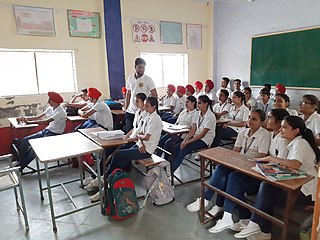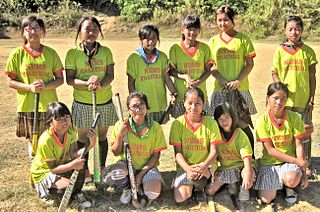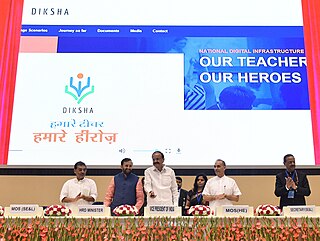Related Research Articles

A teacher, also called a schoolteacher or formally an educator, is a person who helps students to acquire knowledge, competence, or virtue, via the practice of teaching.

Education in India is primarily managed by the state-run public education system, which falls under the command of the government at three levels: central, state and local. Under various articles of the Indian Constitution and the Right of Children to Free and Compulsory Education Act, 2009, free and compulsory education is provided as a fundamental right to children aged 6 to 14. The approximate ratio of the total number of public schools to private schools in India is 10:3.

A parent–teacher association/organization (PTA/PTO), parent–teacher–friend association (PTFA), or parent–teacher–student association (PTSA) is a formal organization comprising parents, teachers and staff that is intended to facilitate parental participation in a school.
The Education Quality and Accountability Office (EQAO) is a Crown agency of the Government of Ontario in Canada. It was legislated into creation in 1996 in response to recommendations made by the Royal Commission on Learning in February 1995.
Eklavya is an Indian NGO based in Bhopal, Madhya Pradesh working in the field of education. It was registered as an all India in 1982. The organization is named after Eklavya, the protagonist of a story in the Mahabharat, for his determination to learn even in the absence of a teacher.
The Right of Children to Free and Compulsory Education Act or Right to Education Act (RTE) is an Act of the Parliament of India enacted on 4 August 2009, which describes the modalities of the importance of free and compulsory education for children between the age of 6 to 14 years in India under Article 21A of the Indian Constitution. India became one of 135 countries to make education a fundamental right of every child when the act came into force on 1 April 2010. The title of the RTE Act incorporates the words 'free and compulsory'. 'Free education' means that no child, other than a child who has been admitted by his or her parents to a school which is not supported by the appropriate Government, shall be liable to pay any kind of fee or charges or expenses which may prevent him or her from pursuing and completing elementary education. 'Compulsory education' casts an obligation on the appropriate Government and local authorities to provide and ensure admission, attendance and completion of elementary education by all children in the 6-14 age group. With this, India has moved forward to a rights based framework that casts a legal obligation on the Central and State Governments to implement this fundamental child right as enshrined in the Article 21A of the Constitution, in accordance with the provisions of the RTE Act.17. (All th children who are disable or if they are from lowersections or economically back ward they will recive a 33℅ reservations in both government and private educational institutions {updated in 2024})

Punjab has a long history of education.
The National Policy on Education (NPE) is a policy formulated by the Government of India to promote and regulate education in India. The policy covers elementary education to higher education in both rural and urban India. The first NPE was promulgated by the Government of India by Prime Minister Indira Gandhi in 1968, the second by Prime Minister Rajiv Gandhi in 1986, and the third by Prime Minister Narendra Modi in 2020.

Tamil Nadu is one of the most literate states in India. The state's literacy rate is 80.33% in 2011, which is above the national average. A survey conducted by the Industry body Assocham ranks Tamil Nadu top among Indian states with about 100% Gross Enrollment Ratio (GER) in primary and upper primary education.

Pema Khandu is an Indian politician and the Chief Minister of Arunachal Pradesh. He is the son of former Chief Minister of Arunachal Pradesh Dorjee Khandu. Since assuming the office of the Chief Minister in July 2016, he and his government have twice changed their party affiliation; in September from the Indian National Congress to the Peoples Party of Arunachal, and then in December 2016 to the Bharatiya Janata Party. Previously he had served as Minister of Tourism, Urban Development and Water Resources in Nabam Tuki's government.

Sarva Shiksha Abhiyan, or SSA, is an Indian Government programme aimed at the universalisation of Elementary education "in a time bound manner", the 86th Amendment to the Constitution of India making free and compulsory education to children between the ages of 6 and 14 a fundamental right. The programme was pioneered by former Indian Prime Minister Atal Bihari Vajpayee. It aims to educate all children between the ages of 6 and 14 by 2010. However, the time limit has been pushed forward indefinitely.

Education in Mizoram consists of a diverse array of formal education systems ranging from elementary to university, from training institution to technical courses. The Government of India imposes mandatory education at least up to the basic level. For this public schools are made free of fees, and provided with free textbooks and school lunch.
Rashtriya Madhyamik Shiksha Abhiyan (RMSA) is a centrally sponsored scheme of the Ministry of Human Resource Development, Government of India, for the development of secondary education in public schools throughout India. It was launched in March 2009. The implementation of the scheme has started from 2009–2010 to provide conditions for an efficient growth, development and equity for all. The scheme includes a multidimensional research, technical consulting, various implementations and funding support. The principal objectives are to enhance quality of secondary education and increase the total enrollment rate from 52% to 75% in five years, i.e. from 2009 to 2014. It aims to provide universal education for all children between 15 and 16 years of age. The funding from the central ministry is provided through state governments, which establish separate implementing agencies. The total budget allocated during the XI Five Year Plan (2002-2007) was ₹2,012 billion (US$24 billion).

The Assam Higher Secondary Education Council (AHSEC) was a state education regulatory board under the jurisdiction of Ministry of Education, Government of Assam that is responsible to regulate, supervise and develop the system of Higher Secondary Education in the State of Assam.
District Institute of Education and Training, Raebareli or DIET Raebareli is a government educational institution under the nodal agency SCERT Uttar Pradesh, which provides academic and research support to elementary education in the Raebareli district. DIET serves as pre service and in service training institute for teachers in the district. Established in 1990, DIET aims to improve the Basic Education System and competence of teachers through regular training programs, projects, seminars, workshops and other academic programmes.
Vidyanjali is a school volunteer programme and an initiative of the Ministry of Human Resource Development of India to boost community and private sector participation in government schools, launched by Smriti Irani. Under the programme, volunteers, including NRIs, retired teachers, government officials, defence personnel, professionals will offer their services for co-scholastic activities for children from class I to VIII. It is the project launched under the aegis of the Sarva Shiksha Abhiyan by the Department of School Education and Literacy.

Kerala Infrastructure and Technology for Education (KITE) is a state owned special purpose company under Department of General Education of the Government of Kerala. It was developed to support ICT enabled education for schools in Kerala. The erstwhile IT@School Project was transformed into KITE for extending its scope of operations in August 2017. KITE was the first SPV company to get funded by KIIFB.

Educational management refers to the administration of the education system in which a group combines human and material resources to supervise, plan, strategise, and implement structures to execute an education system. Education is the equipping of knowledge, skills, values, beliefs, habits, and attitudes with learning experiences. The education system is an ecosystem of professionals in educational institutions, such as government ministries, unions, statutory boards, agencies, and schools. The education system consists of political heads, principals, teaching staff, non-teaching staff, administrative personnel and other educational professionals working together to enrich and enhance. At all levels of the educational ecosystem, management is required; management involves the planning, organising, implementation, review, evaluation, and integration of an institution. Research in educational management should explore the dynamic interplay among educational leaders, their followers, and the broader community to enhance the quality of teaching and learning outcomes.

The National Education Mission is an overarching programme for the school education sector extending from pre-school to class 12, launched in 2018. It was allocated a budget of ₹385.72 billion (US$4.6 billion) in the 2019 Interim Union Budget of India. The stated mission comprises four schemes, namely Saakshar Bharat, Sarva Shiksha Abhiyan, Rashtriya Madhyamik Shiksha Abhiyan and the Centrally Sponsored Scheme on Teacher Education (CSSTE). In 2021, the NIPUN Bharat Mission was launched as part of Samagra Shiksha Abhiyan, teaching literacy and numeracy skills in universities by Grade 3.
The National Achievement Survey (NAS) is a comprehensive educational assessment survey conducted in India every three years. It is administered by the Department of School Education and Literacy, which operates under the Ministry of Education. Since its inception in 2001, the NAS has been conducted eight times. The survey evaluates the learning capabilities and achievements of students in Classes 3, 5, 8, and 10 attending state government schools, government-aided schools, private unaided schools, and central government schools. The NAS serves as an indicator of the effectiveness of the educational system in India, helping to identify gaps and inform the implementation of appropriate remedial measures.
References
- 1 2 "Gunotsav | Elementary Education | Government Of Assam, India". elementary.assam.gov.in. Retrieved 31 December 2023.
- ↑ "Gunotsav | Samagra Shiksha Assam | Government Of Assam, India". ssa.assam.gov.in. Retrieved 31 December 2023.
- ↑ "Gunotsav | Samagra Shiksha Assam | Government Of Assam, India". ssa.assam.gov.in. Retrieved 1 January 2024.
- ↑ "Gunotsav | Directorate of Elementary Education | Government Of Assam, India". dee.assam.gov.in. Retrieved 1 January 2024.
- ↑ Desk, Sentinel Digital (7 May 2023). "Gunotsav in Assam: Some observations - Sentinelassam". www.sentinelassam.com. Retrieved 31 December 2023.
{{cite web}}:|last=has generic name (help)